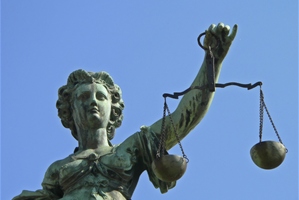| 1. |
 florida v. the department of hhs
florida v. the department of hhs
Florida v. United States Department of Health and Human Services is a lawsuit filed in the United States District Court for the Northern District of Florida by the State of Florida against the United States Department of Health and Human Services seeking to nullify the Patient Protection and Affordable Care Act (PPACA) (part of the United States' 2010 changes to health care) as unconstitutional.[1] On January 31, 2011, U.S. District Judge Roger Vinson ruled that the health insurance mandate in section 1501 falls outside the federal authority in the Constitution, and that the provision could not be severed-
|
|
| 2. |
marbury v. madison
At the end of President John Adams’ term, his Secretary of State failed to deliver documents commissioning William Marbury as Justice of the Peace in the District of Columbia. Once President Thomas Jefferson was sworn in, in order to keep members of the opposing political party from taking office, he told James Madison, his Secretary of State, to not deliver the documents to Marbury. Marbury then sued James Madison asking the Supreme Court to issue a writ requiring him to deliver the documents necessary to officially make Marbury Justice of the Peace. The Marbury v. Madison decision resulted in establishment of the concept of judicial review.
|
|
| 3. |
miranda v. arizona
Ernesto Miranda was arrested after a crime victim identified him, but police officers questioning him did not inform him of his Fifth Amendment right against self-incrimination, or of his Sixth Amendment right to the assistance of an attorney. While he confessed to the crime, his attorney later argued that his confession should have been excluded from trial. The Supreme Court agreed, deciding that the police had not taken proper steps to inform Miranda of his rights.
|
|
| 4. |
gideon v. wainwright
In June 1961, a burglary occurred at the Bay Harbor Pool Room in Panama City, FL. Police arrested Clarence Earl Gideon after he was found nearby with a pint of wine and some change in his pockets. Gideon, who could not afford a lawyer, asked a Florida Circuit Court judge to appoint one for him arguing that the Sixth Amendment entitles everyone to a lawyer. The judge denied his request and Gideon was left to represent himself. He did a poor job of defending himself and was found guilty of breaking and entering and petty larceny. While serving his sentence in a Florida state prison, Gideon began studying law, which reaffirmed his belief his rights were violated when the Florida Circuit Court refused his request for counsel. From his prison cell, he handwrote a petition asking the U.S. Supre
|
|
| 5. |
brown v. board of education
In Topeka, Kansas in the 1950s, schools were segregated by race. Each day, Linda Brown and her sister had to walk through a dangerous railroad switchyard to get to the bus stop for the ride to their all-black elementary school. There was a school closer to the Brown's house, but it was only for white students. Linda Brown and her family believed that the segregated school system violated the Fourteenth Amendment and took their case to court. Federal district court decided that segregation in public education was harmful to black children, but because all-black schools and all-white schools had similar buildings, transportation, curricula, and teachers, the segregation was legal. The Browns appealed their case to Supreme Court stating that even if the facilities were similar, segregated sc
|
|